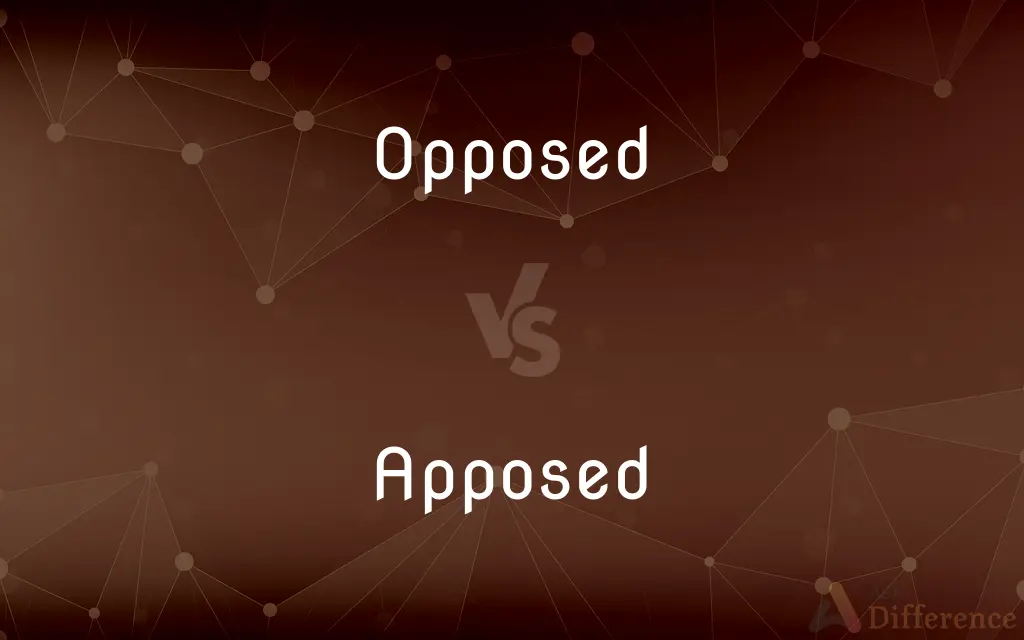Opposed vs. Apposed — What's the Difference?
By Tayyaba Rehman & Maham Liaqat — Updated on April 26, 2024
"Opposed" implies resistance or conflict between entities, while "apposed" refers to placing things side by side or in close proximity.

Difference Between Opposed and Apposed
Table of Contents
ADVERTISEMENT
Key Differences
"Opposed" is generally used to describe a situation or sentiment where entities are in conflict or disagreement, such as opposing views in a debate. In contrast, "apposed" involves positioning things next to each other, often touching or in direct alignment, commonly found in anatomical or architectural contexts.
In discussions or arguments, people are often opposed in their opinions, indicating a clash of ideas or interests. On the other hand, anatomical structures like nerves or vessels may be apposed, suggesting a physical closeness without implying any interaction or opposition.
When two forces are opposed, they act against each other, often resulting in a standoff or a conflict needing resolution. Conversely, apposed elements might not interact dynamically but are merely placed side by side for structural or functional purposes.
The concept of being opposed can extend to emotional or ideological realms, where individuals or groups stand firmly against each other's principles or actions. Whereas, apposition is a more neutral term, focusing purely on the spatial relationship between objects or structures.
Understanding the distinction is crucial in contexts like medical terminology or construction, where the physical relationship between elements (apposed) is different from active resistance or antagonism (opposed).
ADVERTISEMENT
Comparison Chart
Definition
Set against in hostility or resistance
Placed next to or in contact with
Usage Context
Conflict, debates, opposition
Anatomy, architecture
Interaction Type
Active, dynamic
Passive, static
Connotation
Negative, conflicting
Neutral, structural
Example Scenario
Opposing teams in a game
Apposed layers of skin
Compare with Definitions
Opposed
Set against something or someone in conflict or competition.
The two politicians were opposed on every major issue.
Apposed
Situated next to or adjacent.
The bones were apposed at the joint.
Opposed
To be in conflict with.
The proposal was opposed due to environmental concerns.
Apposed
To place things side by side, especially so as to be touching or close.
The surgeon apposed the wound edges neatly.
Opposed
Contrary or opposite in nature or character.
Their ideas are fundamentally opposed.
Apposed
To bring into proximity or contact.
He apposed the two sections of the model.
Opposed
Being in a position of resistance.
She remained opposed to the new policy.
Apposed
To position something alongside or in comparison.
The images were apposed for detailed analysis.
Opposed
To act in opposition to.
They opposed the new development plan vigorously.
Apposed
In biology, to be placed against something else.
The cell layers are closely apposed to each other.
Opposed
To be or act in contention or conflict with
Opposed their crosstown rivals in the season finale.
Apposed
To place in proximity; juxtapose.
Opposed
To be hostile or resistant to; try to prevent
Opposes the building of a new police station.
Apposed
Simple past tense and past participle of appose
Opposed
To set as an opposite in position
Opposed the painting with a mirror across the room.
Apposed
Placed in apposition; mutually fitting, as the mandibles of a bird's beak.
Opposed
To present in counterbalance or contrast
Ideas that were opposed to each other in her first book.
Opposed
To be or act in opposition.
Opposed
Acting in opposition; opposing.
Opposed
Being, of having an opponent; not unopposed.
Opposed
Opposite.
Opposed
Simple past tense and past participle of oppose
Opposed
Characterized by active opposition; as, two bitterly opposing schools of thought.
Opposed
Acting in opposition to; as, the opposing sector of the same muscle group.
Opposed
In opposition to (a policy or attitude etc.);
An opposing vote
Opposed
Being in opposition or having an opponent;
Two bitterly opposed schools of thought
Common Curiosities
Can you give an example of a situation where teams might be opposed?
In a competitive sport, teams are opposed when they compete against each other to win.
Is being opposed always negative?
Being opposed often has negative connotations due to the inherent conflict or resistance, but it can also lead to constructive outcomes through debate and resolution.
What does it mean when two opinions are opposed?
When two opinions are opposed, it means they are in direct conflict or disagreement.
What is the significance of apposition in medical terms?
In medical terms, apposition is important for procedures like suturing, where tissues are aligned and joined.
What role does apposition play in construction?
In construction, apposition can refer to the precise placement of materials or components next to each other for structural integrity.
How does the concept of being opposed apply to legal contexts?
In legal contexts, being opposed might involve parties contesting each other’s positions in court.
How do anatomical structures become apposed?
Anatomical structures become apposed when they are placed next to each other, often in contact or close proximity.
Are opposed and apposed interchangeable in any context?
No, opposed and apposed are not interchangeable as they describe fundamentally different relationships.
Can plants be apposed?
Technically, parts of plants like leaves can be apposed if they grow very close to each other.
What is a common misunderstanding about the word "apposed"?
A common misunderstanding is confusing "apposed" with "opposed," not recognizing that the former refers to physical placement rather than conflict.
Share Your Discovery

Previous Comparison
Pastry vs. Bismarck
Next Comparison
Lifetime vs. LifelongAuthor Spotlight
Written by
Tayyaba RehmanTayyaba Rehman is a distinguished writer, currently serving as a primary contributor to askdifference.com. As a researcher in semantics and etymology, Tayyaba's passion for the complexity of languages and their distinctions has found a perfect home on the platform. Tayyaba delves into the intricacies of language, distinguishing between commonly confused words and phrases, thereby providing clarity for readers worldwide.
Co-written by
Maham Liaqat












































